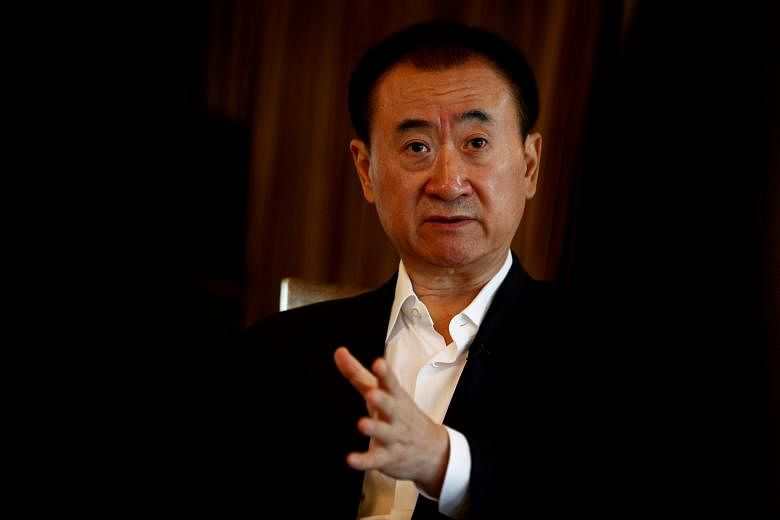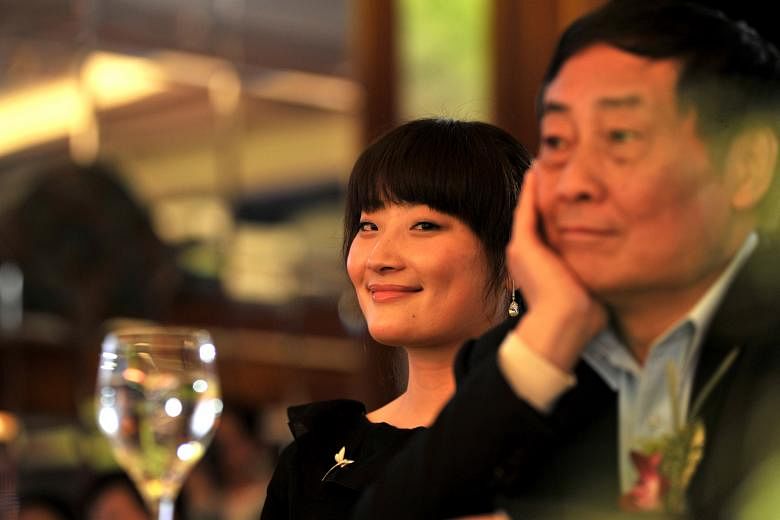China's richest man Wang Jianlin plans to pass his 634 billion yuan (S$132 billion) business empire to professional managers because his only child Sicong is not interested.
"As everyone is already aware, I've asked my son and he said he doesn't want to live a life like mine," said Mr Wang, founder and chairman of conglomerate Wanda Group.
He said that in response to a question on his succession plans at a forum in Beijing on Dec 10, according to a transcript posted on the company's website.
"It's probably better to hand it over to professional managers and we can watch over them at the board level," said the 62-year-old who made his start in business as a property developer in Dalian city in 1988.
This is the second time the self-made tycoon has commented on the matter publicly. He first mentioned it on a Chinese TV show in May, according to Bloomberg.
-
'People's husband'
-
Mr Wang Sicong, 28, is the richest among the children of China's tycoons, and these scions are also known as fuerdai.
He is well known for his outrageous spending habits, including buying the latest gadgets for his dog Coco. In September, he bought eight new iPhones for his pet and put up posts about it on Weibo, a microblogging website.
He is a director at the Wanda Group, and owns a 2 per cent stake that is valued at 12.7 billion yuan (S$2.64 billion), according to the South China Morning Post.
A philosophy major from University College London, Mr Wang is a successful venture capitalist who founded Prometheus Capital in 2011, with 500 million yuan from his father Wang Jianlin - China's richest man. The firm specialises in funding Internet entertainment, gaming and social networking start-ups.
He is also the founder of Invictus Gaming, a professional "e-sports" gaming team.
He reportedly spent US$516.7 million (S$747 million) to build a seven-star hotel in a prime district - the Bund - on Huangpu River in Shanghai. The hotel opened in June.
Mr Wang is known as "the people's husband" in China as he is seen as one of the most eligible bachelors in the country.
With 21 million followers on his Weibo account, he is also an Internet celebrity. His spending habits and lavish lifestyle were criticised by the state-run China Daily in a commentary last year.
"Young people have their own choices," he said.
There is a growing trend of sons and daughters of Chinese businessmen showing little interest in taking over the family business.
A report on Chinese family business succession released last year showed that only 40 per cent of the second generation surveyed are willing to inherit the family business.
Dr Jean Lee, co-director of the Centre for Family Heritage at China Europe International Business School in Shanghai told Forbes magazine in an interview that this second generation reluctance poses a "real and common" challenge.
The problem appears at more than half of China's traditional private sector companies, she said, particularly in businesses in Wenzhou or Yiwu in Zhejiang province, where the second generation is often not interested in taking over.
Most of these second-generation offspring go to university, some abroad, which means they have a wider range of career options compared with their parents. After they graduate, they prefer to forge their own paths, either entering the financial industry or setting up their own businesses, she said.
This will soon become an issue for Chinese businesses as the country's entrepreneurs approach old age. According to a 2015 list of the 500 richest tycoons in China, 67 per cent are at least 50 years old. It is a matter of time before these magnates will need to find successors to take over the reins.
Given that nearly 90 per cent of Chinese private enterprises are family businesses, China could have as many as three million businessmen facing the problem of finding suitable and willing heirs in the next five to 10 years, estimates columnist Wu Xiaobo of news website Sixth Tone.
But most of the high-profile billionaires in China have, in recent years, passed on their businesses to their children. Mr Zong Qinghou, 71, founder of beverage giant Wahaha made his only daughter Kelly Zong, 34, the chief executive of the company. Meanwhile Ms Liu Chang, 36, took over from her father, Mr Liu Yonghao, 65, in 2013 as the chief executive of agribusiness New Hope Liuhe, according to South China Morning Post.
The latest billionaire to hand over the reins to his daughter is Mr Zhou Chengjian. The 51-year-old recently appointed his 30-year-old daughter Hu Jiajia chairman and chief executive of Metersbonwe, one of China's largest fashion chains.
Mr Wang will choose his rightful heir from a pool of managers who run the five business groups within his company.
"We will not deliberately choose a successor. It depends on who emerges the winner after they compete. It may not be such a good idea to deliberately groom anyone," he said.



